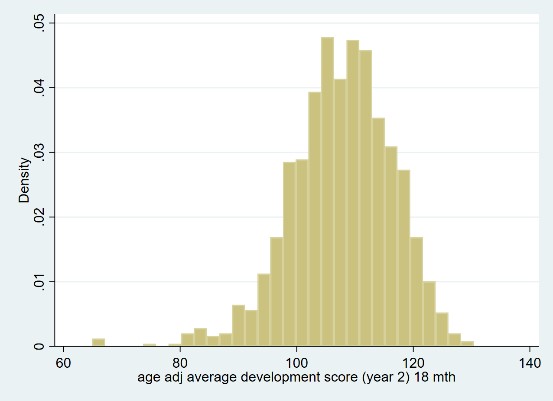The Avon Longitudinal Study of Parents and Children (ALSPAC) assessed their cohort members (CMs) at 18 months’ age (Children in Focus Clinic) using the Griffiths Scales of Mental Development (GSMD).
Details on this measure and the data collected from the CMs are outlined in the table below.
| Year of data collection: | 1993-1994 |
| Domain: | Verbal and non-verbal ability |
| Measures: | Verbal ability |
| Non-verbal/performance ability | |
| Psychomotor Abilities | |
| Personal/social skills | |
| CHC: | G (General ability) |
| CLOSER Source: | Explore this sweep in CLOSER Discovery: ALSPAC Early Years (13 months to 4 years 11 months) (opens in a new tab) |
| Administration method: | Trained interviewer; clinical setting; guided play, physical task, oral questions, pen and paper. |
| Procedure: | The Griffiths Test consists of five subscales that assess the following areas of development: i) locomotion, ii) personal/social skills, iii) hearing and speech, iv) hand-eye coordination, and performance. The subscales consist of 86 items each. The first 48 items are designed for children aged 0 - 2 years, with the remaining 38 items belonging to the extension of the scale (6 additional items per year). Standardised developmental quotients (DQs) for each subscale are calculated using the formula: DQ = (Mental age x 100)/Chronological age. An overall DQ is calculated using the mean scores across all 5 scales. Due to time constraints, only the items pertaining to the age 12 to 24 month period were administered when children were aged 18 months. Thus, study children who were considerably advanced/delayed may have received inflated/deflated scores respectively. The scales were administered by eight trained testers. Each of the five sub-tests is detailed in a separate section below. Duration: approximately 45 minutes for each full sub-test |
| Link to questionnaire: | http://www.bristol.ac.uk/alspac/researchers/our-data/clinical-measures/ (opens in new tab) |
| Scoring: | Standardised DQ (0 - 100) |
| Item-level variable(s): | Not readily available |
| Total score/derived variable(s): | cf772 – cf783 Explore these variables in CLOSER Discovery: ALSPAC Children in Focus 4Mth-61Mth Clinics Dataset (opens in a new tab) |
| Descriptives: | Age adjusted average development score |
| N = 1,390 | |
| Range = 64.91 - 130.37 | |
| Mean = 88.02 | |
| SD = 42.81 | |
(click image to enlarge) |
|
| Age of participants: | Mean = 79.90 weeks, SD = 1.47, Range = 76 - 87 |
| Other sweep and/or cohort: | None |
| Source: | Griffiths, R. (1970). The abilities of young children. London: Child Development Research Centre. |
| Technical resources: | None |
| Example articles: | Hibbeln, J. R., Davis, J. M., Steer, C., Emmett, P., Rogers, I., Williams, C., & Golding, J. (2007). Maternal seafood consumption in pregnancy and neurodevelopmental outcomes in childhood (ALSPAC study): an observational cohort study. The Lancet, 369(9561), 578-585. |
| Pearson, R. M., Heron, J., Melotti, R., Joinson, C., Stein, A., Ramchandani, P. G., & Evans, J. (2011). The association between observed non-verbal maternal responses at 12 months and later infant development at 18 months and IQ at 4 years: A longitudinal study. Infant Behavior and Development, 34(4), 525-533. |
For the named items in the table above, links are provided (where applicable) to their corresponding content on CLOSER Discovery. Where a variable range is provided, full variable lists can be accessed through the ‘Variable Groups’ tab on the linked Discovery page.
Go to:
- Overview of all cognitive measures in ALSPAC
- Overview of childhood cognitive measures across all studies
This page is part of CLOSER’s ‘A guide to the cognitive measures in five British birth cohort studies’.
